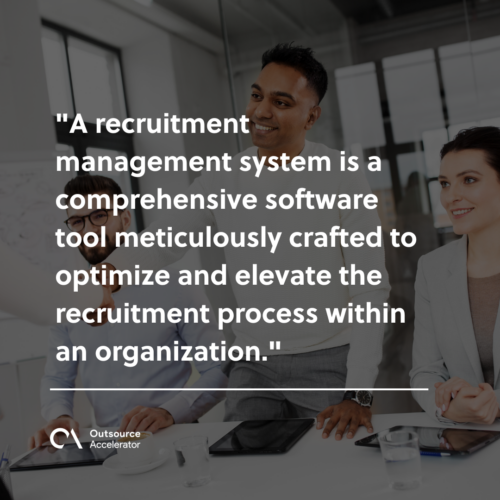Why your business needs a recruitment management system

Streamlining the recruitment process remains crucial even when an organization boasts a hard-working in-house recruitment team.
While a dedicated hiring team may have excellent instincts, an automated HR software solution may help them improve their hiring process. Integrating a recruitment management system into the workflow may also enhance the team’s effectiveness.
Continue reading to learn more about a recruitment management system, its benefits to recruiters, how it functions, its key features, and essential tips for choosing the right one.
What is a recruitment management system?
A recruitment management system is a comprehensive software tool meticulously crafted to optimize and elevate the recruitment process within an organization.
It functions as a centralized hub where recruitment teams and HR specialists can seamlessly oversee all facets of the hiring lifecycle.
With its features and capabilities, a recruitment management system simplifies recruitment tasks, boosts efficiency, enhances collaboration, and fosters data-driven decision-making.
Moreover, it serves as the digital backbone of the recruitment process, enabling organizations to attract, assess, and select the most qualified candidates.
Why a recruiter needs a recruitment management system
Recruiting can often be inundated with administrative tasks like resume screening and interview scheduling. This is why recruiters need a recruitment management system because it amplifies efficiency and time management.
With a recruitment management system automating time-consuming tasks, recruiters can spend more time connecting with candidates and stakeholders. Keep in mind that this relationship-building is crucial in attracting top talent.
More importantly, it enables recruiters to communicate effectively with candidates, informing them about their application status and providing timely feedback.

How does a recruitment management system work?
A recruitment management system operates as a sophisticated digital infrastructure that optimizes and automates various stages of the recruitment process.
It digitizes and enhances recruitment operations from start to finish. This provides recruiters and HR professionals with invaluable tools and capabilities.
The process begins with job posting and sourcing. Recruiters create job listings within the RMS, and the system can distribute these postings across multiple channels.
One of the key functionalities of a recruitment management system is automated resume screening. Using advanced AI and machine learning algorithms, it can automatically analyze resumes and rank candidates based on predefined criteria.
Essential features of a recruitment management system
Recruitment management systems come with many features to support recruiters in their efforts.
Here are some of the notable features of an excellent recruitment management system:
- Reporting and analytics – A recruitment management system often offers comprehensive reporting tools that provide valuable insights into recruitment performance. It includes metrics related to time-to-fill and the effectiveness of various recruitment sources.
- Integration capabilities – The system seamlessly integrates with other essential HR systems, such as applicant tracking systems (ATS), payroll software, and human resources information systems (HRIS).
- Collaboration tools – Within the recruitment management system, there are features specifically designed to facilitate seamless communication and collaboration among recruiters, hiring managers, and interviewers.
- Mobile accessibility – A recruitment management system ensures accessibility from mobile devices, empowering recruiters to manage recruitment tasks efficiently.
- Compliance management – A recruitment management system includes robust tools to ensure the recruitment process aligns with legal and regulatory requirements, such as Equal Employment Opportunity (EEO) regulations.

Recruitment management systems are designed to be comprehensive solutions that address the multifaceted needs of modern recruitment. Furthermore, their features enable more efficient, data-driven, and compliant hiring practices.
How to choose the right recruitment management system
Selecting the right RMS for your organization is a critical decision that can impact your recruitment efficiency and success.
Here are key steps to help you make an informed choice:
Identify your needs and goals
The first step in selecting the right recruitment management system is to conduct a thorough internal assessment of your organization’s recruitment needs and goals. Consider the unique factors that define your company, such as its size, industry, and recruitment volume.
You should also determine the specific challenges you aim to address, whether streamlining a complex recruitment process or scaling up for rapid growth. A self-assessment sets the foundation for identifying the features and functionalities of your RMS.
Evaluate user-friendliness
An intuitive and user-friendly recruitment management system ensures that both recruiters and candidates can easily navigate the system.
To assess user-friendliness, consider conducting user testing sessions or requesting product demos from potential vendors. Pay attention to factors such as the intuitiveness of the user interface, ease of navigation, and clarity of instructions.
Check integration capabilities
Seamless integration with your existing HR software and systems is essential for ensuring a smooth flow of data and process automation.
Verify that the recruitment management system can integrate with your Applicant Tracking System (ATS), payroll software, and other relevant tools.
Review reporting and analytics
Robust reporting and analytics capabilities are the backbone of data-driven decision-making in recruitment.
As such, you should examine the depth and customization options of the recruitment management system’s reporting tools.
These tools should provide comprehensive insights into recruitment performance, including time-to-fill, source effectiveness, and candidate quality.

Seek vendor reputation
A reputable vendor provides a reliable RMS and offers ongoing support, updates, and resources for your team’s success.
Choose a vendor with a strong commitment to customer satisfaction and a history of delivering quality products and services in recruitment management systems.
Recruitment management system: Simplifies staffing operations
Investing in a recruitment management system can be a game-changer for your business. It will allow you to build a high-performing team that drives your organization’s success.
Stay ahead of the competition and take your recruitment efforts to the next level with this automated solution tailored to your staffing needs.







 Independent
Independent




